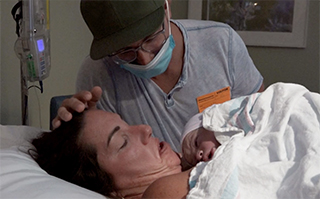A Day in the Life of a Doula at NewYork-Presbyterian Brooklyn Methodist Hospital
A unique program provides doulas to support parents through labor, delivery, and postpartum care.
Inside a labor and delivery room at NewYork-Presbyterian Brooklyn Methodist Hospital, doula Kerri Evers is helping mom-to-be Maura Fitzgerald get more comfortable as she prepares to give birth.
Evers dims the lights and diffuses a woody spruce scent into the room. As they chat about how eager Maura — already mom to four daughters — is to learn the sex of her fifth child, Evers begins a foot massage. Maura is lulled into a relaxed state. “It feels amazing,” she says.
About a half hour later, with Maura close to delivering, Evers shows Maura’s fiancé, Anthony Daly, how to adjust her pillow for better support during contractions. As her midwife gives Maura instructions to push, Evers stays by her side and coaches her breathing. With a final push, the baby is born — and the whole room breaks out into laughter. It’s a girl.
As the baby quiets down and the family settles into a peaceful snuggle, Evers takes photos with Anthony’s phone before leaving them to their skin-to-skin time.
“She was magnificent,” Maura says. “This was my fifth baby, and I’ve never had an experience like that. I wish I had a doula for the other four. I felt like she was my cousin.”

Maura Fitzgerald and Anthony Daly with their baby daughter.
A Unique Program for All Parents
Evers is one of a team of doulas at the hospital who offer support to parents through the labor and birthing process and after the baby is born.
While some expectant parents hire a private doula to come to a hospital with them, NewYork-Presbyterian Brooklyn Methodist Hospital’s program is unique in that parents of any income are offered a doula at no charge.
The program began in 2020 during the COVID-19 pandemic “and was such a success on every level — for the patients, the nurses, the midwives, the doctors — that we didn’t want to let it go,” says Roseanne Seminara, Maura’s midwife and the director of midwifery at NewYork-Presbyterian Brooklyn. Today, there are a total of five birth doulas and five postpartum doulas.
“One of the best things about the doula program is that when you come to the hospital in labor you’re offered the doula services, regardless of your economic status,” says Seminara, who co-founded the program. “This is our way of making sure that everyone has an equal opportunity to have a really pleasant experience.”
The Role a Doula Plays
Doulas don’t provide medical care, but serve as “someone who is there for a laboring person emotionally and physically,” Evers says. “I’m your No. 1 fan to encourage you and to help you have the birth experience that you desire. We want to make sure you feel loved and cared for.”
Doulas use tools and techniques like aromatherapy, massage, reflexology, reiki, birthing balls and bars, and handheld fans to provide comfort and support. They also encourage parents through contractions and the birth, coaching them with breathing and positioning techniques, and helping with the baby’s first latch to the mother’s breast shortly after birth.
“It’s such a privilege to share that experience with people,” Evers says. “It’s a special time, and I’m always thankful to be there.”
The doulas support all types of births, whether with a midwife, who can deliver low-risk pregnancies, or an OB-GYN doctor. That includes nonmedicated and epidural births, as well as support to parents having a C-section, although only outside of the operating room.
After the baby is born, the support continues on the postpartum floor, where doulas help get breastfeeding off to a good start and share information about recovery from labor and delivery. These postpartum doulas also support parents whose babies are in the neonatal intensive care unit, including with help learning how to pump milk. All of the doulas are certified lactation counselors.
“I really love the doula program,” says Seminara, “because it allows women to have that extra comfort, that extra hands-on help.”
Additional Resources
Learn more about women’s health at NewYork-Presbyterian.
